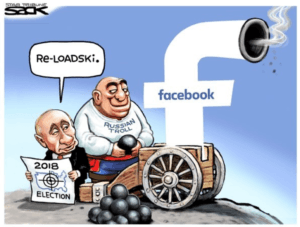Hacking and the Midterms
October 11, 2018

As we continue to debate the role that hacking played in the 2016 election, government officials and others are grappling with the
future of American elections,especially next month’s midterm elections. People who are concerned with the long-term civic and political health of the United States understand that free and fair elections are a fundamental component of our democracy, and they are worried that a loss of trust in the electoral process could do serious damage to the country. Below, we suggest a few resources and discussion questions to help students think about the hacking of U.S. elections, and what to do about it.
When discussing hacking and other attempts to influence elections in ways that are less than ethical or transparent, terminology can be confusing. Remind students that although the term “hacking” is often used to describe efforts to influence the election, other activities (such as intentionally spreading false stories and creating online identities to sow discord and distrust) are part of the issue as well.
- Review with students some facts about the hacking and interference during the 2016 presidential election. For an overview, see this CNN round-up.
- Ask students: How does the idea that American elections are being tampered with make you feel about voting and government?
- Are they sad? Angry?
- Have they become less trustful of government and elections?
- What do they think it does to the country if citizens are less trustful of the electoral process?
- Watch this seven-minute CBS News story about the hacking and what to do about it.
- Beginning at the video’s 4:25 mark, there is a brief discussion about the possible responses to interference in U.S. elections. They mention:
- Creating a federal cybersecurity agency
- Passing tighter online privacy laws at the state or federal level
- Better self-policing by social media companies
- Ask students to discuss whether these ideas seem sufficient to address the problem and to brainstorm other possible responses. Some ideas might include:
- Stiff penalties, such as sanctions or even military action, against countries that interfere with U.S. elections
- Voting infrastructure updates, such as improved voting machines
- Regulations on social media to make the creation of fake accounts more difficult
- Ask students to read this article in The Guardian, which explores different ways in which individuals and groups could interfere with the midterm elections.
- Ask students to discuss how high a priority it should be to shore up election security.
- Ask students: What do you think would happen, and what should happen, if the United States holds an election and people don’t believe the results?
If you’ve discussed election hacking and interference with your students, what did you talk about? What were their ideas and responses? Feel free to share any resources you used in the comments below!







